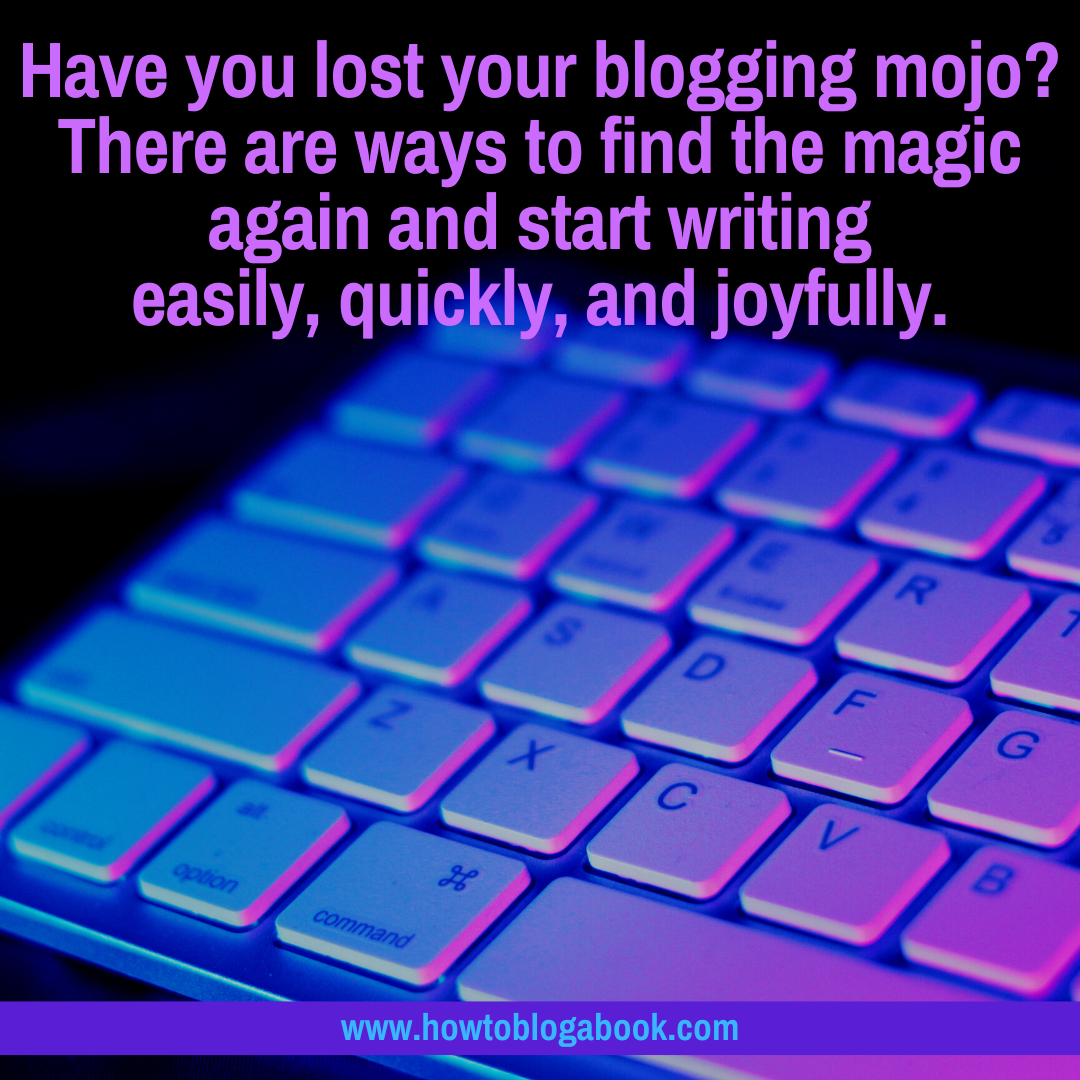 Have you ever lost your writing mojo? You aren’t alone. And any blogger who has had this experience knows how difficult it is to publish posts when you are struggling to write.
Have you ever lost your writing mojo? You aren’t alone. And any blogger who has had this experience knows how difficult it is to publish posts when you are struggling to write.
So, let’s agree that blogging mojo is pretty much the same as writing mojo since blogging is writing. But know this: You can find the magic again and start writing and publishing posts easily, quickly, and joyfully in no time.
How do I know? Because I lost my mojo for a while, but I got it back again.
Where Did You Lose Your Writing Mojo?
Losing your writing mojo seems to happen when you least expect it, seemingly without reason. One day you are blogging as usual, and the next, you can’t get a complete sentence together. The reason for this predicament can feel a bit like a mystery.
Like most of us—me included, you will want to know why you lost your mojo. But the reason really doesn’t matter.
The reason(s) for losing your writing mojo actually is much less important than the ways to find it. I know you want to understand what happened, maybe so you can avoid having the same problem in the future. Or you might simply want to place blame—“It’s so-and-so’s fault that I have blogger’s block!”
Believe me…I get it (especially the blame part). But in the end, the only thing that matters is that you regain your writing mojo. Then, if it disappears in the future, you’ll know how to bring it back like a magician producing a rabbit out of a hat.
10 Ways to Get Back Your Writing Mojo
 The following 10 strategies helped me get my mojo back when I felt writing was hard…so hard that I didn’t bother to try writing for quite some time.
The following 10 strategies helped me get my mojo back when I felt writing was hard…so hard that I didn’t bother to try writing for quite some time.
But writers write, right? And bloggers write and publish posts regularly.
I’m a writer…and a blogger. Therefore, I knew I needed to find my mojo again.
I tried a lot of different tricks, tactics, and tips. However, the following ones helped me most, and I feel certain they’ll work for you, too.
1. Stand up.
Most writers work sitting down, which doesn’t promote deep breathing or good circulation. That means your body—including your brain—doesn’t get the oxygen or blood it needs. When you stand while writing instead, you allow yourself to breathe fully. As a result, you will feel more creative and clear-headed. You also might feel more motivated, especially if you don’t allow yourself to sit until you finish a specific number of words or pages. Find a place in your home to use your laptop that is the correct height for typing. Or purchase a portable standing desk or a desktop that goes up and down. (I have both.)
2. Be accountable.
It’s incredible how we typically lack accountability with ourselves but not others. So, if you are struggling to keep your word to yourself, give it to someone else instead. Every morning tell your accountability buddy what you intend to accomplish. Then report back to them daily (not weekly). You’ll be amazed at how much you get done when you have a “deadline” and someone expecting to receive your work—or at least an honest report that you did it. (This person does not have to be another writer.)
3. Move your body.
Sitting is sedentary and not conducive to creativity. Again, your brain needs oxygen, and sitting promotes shallow breathing. So, if you don’t want to stand and write, move your body before you begin a writing period. Exercise, dance, do yoga or tai chi, take a walk, or skip around your house. Anything that feels good or gets your heart pumping works.
4. Change your energy.
Energy is everything! And that’s why you need it to write. If you’ve lost your writing mojo, you likely show up at your computer feeling depressed, anxious, defeated, or angry. It’s hard to write when you feel negative emotions because they lower your energy. Therefore, it’s imperative to raise your energy before you attempt to write. Watch funny Facebook or Instagram stories. Go out in nature. Play with the dog or pet the cat. Call a friend who can be your cheerleader. View motivational or inspirational YouTube videos. As mentioned above, you can also move your body; exercise is a great energy enhancer! Then, when you are feeling upbeat and energized, try writing.
5. Play music.
Music is the great healer. It is also an energy and mood enhancer (as long as you don’t listen to songs about something depressing). Some people, like myself, like to listen to music meant to increase focus. Others want to listen to their favorite artists—rock, jazz, classical, blues…whatever! So if you usually try to write in silence, turn on your favorite music tracks. Then, see if that doesn’t help you get your mojo back.
6. Use visualization.
Visualization, active daydreaming, and self-hypnosis are fabulous ways to program your brain to write quickly and effortlessly. So, if you want to get your writing mojo back, try one of them. An easy breathing technique, like 7–11 breathing, will put you in a relaxed state conducive for these exercises. Then simply imagine yourself writing. Then, using your mind’s eye, visualize what it would feel and be like to have your writing mojo back—mentally experience being in the writing flow. Finally, imagine yourself six months into the future; what results would you achieve by writing quickly and effortlessly by that point? Do this two or three times per day for a month…or longer, and you will have reprogrammed your brain to get in the writing flow.
7. Remember your “why.”
Most nonfiction writers write because they have a strong sense of purpose. They want to make a difference or be of service. They may even have a cause of movement to promote. You will be more likely to write when you keep your purpose forefront in your mind. After all, someone needs your book, article, or blog post. And you fulfill your purpose by giving them what they need. Getting clarity on your purpose as a writer will fuel your writing and add a big of necessity and urgency to the mix, which will get your fingers on the keyboard.
8. Get tapped in.
One of my favorite strategies is to call on your “spirit team” or a higher power to help me write. (Yes, really.) Many writers believe God, spirit guides, ancestors, or angels help them write by providing information, wisdom, inspiration, or guidance. If you are one of those people, invoke your spirit team before beginning a writing session. Ask for guidance and for your writing blocks to be removed. You might add in a bit of meditation or a ritual. Then pull out your laptop and write.
9. Change your identity.
As I said before, writers write. So be a writer. If you take on the identity of a writer, you will do what writers do…write. That will be your habit, and you’ll form it naturally because it will align with your identity. To have a completed (and published) writing project, you must first be a person who can do what writers do—write. So tell yourself daily that you are a writer. Then show up as a writer every day.
10. Do the thing.
All that’s left is for you to do “the thing”…write. Sometimes, that’s what it takes. Don’t wait for motivation or inspiration or for your writer’s block to suddenly disappear. Just write. Even when it’s hard, write. Even when you don’t think you have anything to say, write. Even with the writing is horrible, write. Write every day at the same time…no matter what. No excuses. Just write, and your mojo will return.
Focus on What You Want
Last but not least, don’t keep telling yourself you’ve lost your writing mojo. Stop focusing on what you don’t have…and don’t want. Instead, focus on what you want—to be in the writing flow.
Whenever you find yourself bemoaning that you aren’t writing as easily or joyously as you’d like, turn your mind to a time when you did. Remember yourself writing magically. And tell yourself over and over again, “I am a writer, and writing comes easily and effortless to me.”
If you ever lost your writing mojo, tell me how you got it back. And please share this post with someone who is feeling challenged to write or on social media. If you need some support getting it back, let’s have a chat! You can schedule a brief appointment with me here. Or join the Nonfiction Writers’ University for group Author Coaching.
Photo courtesy of evgenyatamanenko.

Leave a Reply